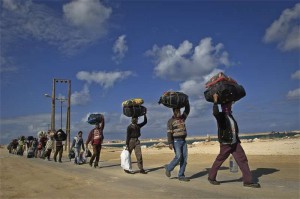
“The events in the coming days will be critical in determining whether mass displacement from the eastern part of Libya takes place,” UNHCR’s chief spokesperson, Melissa Fleming, told journalists in Geneva. She added that it was possible the current conflict could cut off access to safe places and passage out of the country.
Fleming said UNHCR staff had recorded an increase in the number of Libyans fleeing into Egypt in the past few days, with around 1,490 arriving on Wednesday, out of a total of 3,163 people.
The majority of those interviewed at the Egyptian border said that they left because of fear of being caught up in fighting. Many mentioned the threats made by the Libyan government in recent days to bombard the port city of Benghazi, which is held by anti-government forces.
After crossing into Egypt on Thursday, a Libyan family from the eastern town of Ajdabiyya told UNHCR that radio broadcasts are telling the population that they should leave or risk being caught up in combat. They also said that planes were dropping pamphlets encouraging civilians to leave.
A team from the Reuters news agency told UNHCR that they had narrowly escaped from the eastern town of Ajdabiyya on Wednesday as it fell to pro-government troops. “They came from everywhere in massive force and the rebels were no match. People ran for their lives,” one of the journalists said.
A Palestinian member of the same Reuters crew has been denied entry into Egypt. He is with a 64-year-old Palestinian man and his daughter, who have been waiting since Tuesday. Other Palestinian families have been turned back.
The UNHCR team met two men who arrived at the border with gunshot wounds. One of them, who claimed to be a revolutionary shot in the fighting in the town of Raz Lanuf last week, said there was no more room in the Benghazi hospital, forcing him to come to Egypt for treatment.
Some of those interviewed were non-commital about the reasons for their departure, saying that they had simply come to seek medical attention. Yet the packed cars, piled high with luggage, suggested otherwise. One man said, “We wanted democracy but now we got war.”
Meanwhile, on the Tunisian border with Libya, distant sounds of gunfire were heard from deep inside Libya on Friday. In recent days, about 1,000 new arrivals a day have been crossing into Tunisia, the majority originating from sub-Saharan Africa.
UNHCR heard consistent accounts from new arrivals of all nationalities about numerous checkpoints along the route from Tripoli to the Ras Adjir border with Tunisia. They described harassment from pro-government soldiers.
“Refugees and asylum-seekers who are in touch with UNHCR via our hotline in Tripoli and Geneva have reported that fleeing to the border has become much more perilous, particularly for single men, who risk being forcibly recruited into the army,” Fleming said in Geneva.
The family of an Ethiopian man in Tripoli claims that he narrowly escaped forced recruitment when pro-government forces came to the abandoned aircraft hangar in a suburb of Tripoli where he and around 1,500 other people, including Sudanese and Chadians, have taken refuge.
Hundreds of refugees remain in hiding in Libya, with many reporting to UNHCR that they are running out of food and living in a constant state of fear. UNHCR national staff in Tripoli and a number of partners continue to offer assistance to the refugees and asylum-seekers they are in touch with.
Meanwhile, UNHCR and the International Organization for Migration (IOM) announced on Friday that their joint evacuation programme for migrant workers fleeing Libya to Tunisia and Egypt had repatriated more than 50,000 people stranded at border camps. Tens of thousands of others were taken home by aircraft and ships provided by their governments. “This is one of the biggest humanitarian evacuations in history,” IOM Director General William Swing said.
The two organizations also appealed on Friday to donor governments for renewed substantial funding and logistical assets to handle the second phase of evacuations. IOM estimates that more than 1 million migrant workers remain in Libya, including many from sub-Saharan Africa.
At the height of the exodus, more than 17,000 people who fled Libya were crowded into a UNHCR-supported transit camp at the Tunisian border, many awaiting help to return to their home countries. As of today, only 6,500 people remain stranded in Tunisia, 2,500 in Egypt and 1,500 in Algeria and Niger. Most will be evacuated by IOM and UNHCR flights this weekend.
“We are grateful to Tunisia, Egypt, Algeria and Niger for offering refuge to thousands of civilians fleeing Libya daily and in dire need of assistance,” said UN High Commissioner for Refugees António Guterres. “With impressive help from governments, we have been able to manage the massive and sudden movement of tens of thousands of people. But this humanitarian crisis is far from over.”
As of Wednesday this week, slightly more than 300,000 people have fled from Libya to neighbouring countries. This includes almost 160,000 to Tunisia, close to 130,000 to Egypt.
UNHCR Hotline numbers:
In Libya
Land line:+218-21-4777503 (24 hours)
Mobile:+218-92-552-3671 (9:00 to 14:00 hours)
Mobile:+218-91-444-31-94
Mobile:+218-92-686-23-38
In Geneva
+41 22 739 8855
+41 22 739 8465
+41 22 739 7484
+41 22 739 8542
